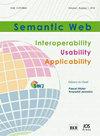Conjunctive query answering over unrestricted OWL 2 ontologies
IF 2.9
3区 计算机科学
Q2 COMPUTER SCIENCE, ARTIFICIAL INTELLIGENCE
引用次数: 0
Abstract
Conjunctive Query (CQ) answering is a primary reasoning task over knowledge bases. However, when considering expressive description logics, query answering can be computationally very expensive; reasoners for CQ answering, although heavily optimized, often sacrifice expressive power of the input ontology or completeness of the computed answers in order to achieve tractability and scalability for the problem. In this work, we present a hybrid query answering architecture that combines various services to provide a CQ answering service for OWL. Specifically, it combines scalable CQ answering services for tractable languages with a CQ answering service for a more expressive language approaching the full OWL 2. If the query can be fully answered by one of the tractable services, then that service is used, to ensure maximum performance. Otherwise, the tractable services are used to compute lower and upper bound approximations. The union of the lower bounds and the intersection of the upper bounds are then compared. If the bounds do not coincide, then the “gap” answers are checked using the “full” service. These techniques led to the development of two new systems: (i) RSAComb, an efficient implementation of a new tractable answering service for RSA (role safety acyclic) (ii) ACQuA, a reference implementation of the proposed hybrid architecture combining RSAComb, PAGOdA, and HermiT to provide a CQ answering service for OWL. Our extensive evaluation shows how the additional computational cost introduced by reasoning over a more expressive language like RSA can still provide a significant improvement compared to relying on a fully-fledged reasoner. Additionally, we show how ACQuA can reliably match the performance of PAGOdA, a state-of-the-art CQ answering system that uses a similar approach, and can significantly improve performance when PAGOdA extensively relies on the underlying fully-fledged reasoner.在不受限制的owl2本体上的联合查询应答
联合查询(CQ)回答是基于知识库的主要推理任务。然而,当考虑表达性描述逻辑时,查询应答可能在计算上非常昂贵;CQ回答的推理器虽然经过了大量优化,但为了实现问题的可跟踪性和可扩展性,往往牺牲了输入本体的表达能力或计算答案的完整性。在这项工作中,我们提出了一种混合查询应答体系结构,它结合了各种服务,为OWL提供CQ应答服务。具体来说,它将可伸缩的可处理语言的CQ应答服务与更具表达性的接近完整OWL 2的语言的CQ应答服务相结合。如果查询可以由一个可处理的服务完全回答,则使用该服务,以确保最大性能。否则,使用可处理的服务来计算下界和上界近似。然后比较下界的并和上界的交。如果边界不一致,则使用“full”服务检查“gap”答案。这些技术导致了两个新系统的发展:(i) RSAComb,一种针对RSA(角色安全无环)的新型可处理应答服务的有效实现;(ii) ACQuA,一种将RSAComb、PAGOdA和HermiT结合在一起的混合架构的参考实现,为OWL提供CQ应答服务。我们的广泛评估表明,与依赖完全成熟的推理器相比,在像RSA这样更具表现力的语言上进行推理所引入的额外计算成本仍然可以提供显着的改进。此外,我们还展示了ACQuA如何可靠地匹配宝塔的性能,宝塔是一种使用类似方法的最先进的CQ应答系统,当宝塔广泛依赖于底层成熟的推理器时,ACQuA可以显著提高性能。
本文章由计算机程序翻译,如有差异,请以英文原文为准。
求助全文
约1分钟内获得全文
求助全文
来源期刊

Semantic Web
COMPUTER SCIENCE, ARTIFICIAL INTELLIGENCEC-COMPUTER SCIENCE, INFORMATION SYSTEMS
CiteScore
8.30
自引率
6.70%
发文量
68
期刊介绍:
The journal Semantic Web – Interoperability, Usability, Applicability brings together researchers from various fields which share the vision and need for more effective and meaningful ways to share information across agents and services on the future internet and elsewhere. As such, Semantic Web technologies shall support the seamless integration of data, on-the-fly composition and interoperation of Web services, as well as more intuitive search engines. The semantics – or meaning – of information, however, cannot be defined without a context, which makes personalization, trust, and provenance core topics for Semantic Web research. New retrieval paradigms, user interfaces, and visualization techniques have to unleash the power of the Semantic Web and at the same time hide its complexity from the user. Based on this vision, the journal welcomes contributions ranging from theoretical and foundational research over methods and tools to descriptions of concrete ontologies and applications in all areas. We especially welcome papers which add a social, spatial, and temporal dimension to Semantic Web research, as well as application-oriented papers making use of formal semantics.
 求助内容:
求助内容: 应助结果提醒方式:
应助结果提醒方式:


